- Home
- Sam Savage
It Will End With Us
It Will End With Us Read online
IT WILL END WITH US
COPYRIGHT © 2014 Sam Savage
COVER AND BOOK DESIGN by Linda Koutsky
COVER PHOTOGRAPH © William Baldwin
AUTHOR PHOTOGRAPH © Nancy Marshall
Coffee House Press books are available to the trade through our primary distributor, Consortium Book Sales & Distribution, cbsd.com or (800) 283-3572. For personal orders, catalogs, or other information, write to: [email protected].
Coffee House Press is a nonprofit literary publishing house. Support from private foundations, corporate giving programs, government programs, and generous individuals helps make the publication of our books possible.
We gratefully acknowledge their support in detail in the back of this book.
Visit us at coffeehousepress.org.
LIBRARY OF CONGRESS CIP INFORMATION
Savage, Sam, 1940–
It will end with us / Sam Savage. — First edition.
pages cm
ISBN 978-1-56689-380-0 (EBOOK)
I. Title.
PS3619.A8418 2014
813’.6—DC23
2014010613
TO NORA, ONE MORE TIME
“It’s a poor sort of memory that only works backwards,” the Queen remarked.
— LEWIS CARROLL
These fragments I have shored against my ruins.
— T. S. ELIOT
CONTENTS
Chapter 1
Funder Acknowledgments
About the Author
I wasn’t going to begin again, having stopped, apparently, and started up again, foolishly, too many times already, attempting to write about my family and Spring Hope and myself there with them and later there without them.
Writing a few pages and giving up.
Between one stopping and another starting there was always an interlude, filled in its first part by regret at having stopped and in its second part by excitement at starting again, finally, and I tried to write about that too once, or maybe twice, I don’t remember, a tragicomic tale of my endeavors to write that other thing, this one to be titled Pendulum.
Or Oscillation, to avoid associations with Poe.
And wrote several more pages that I filed away with the rest.
Rejecting the temptation to lay them out on the floor and scribble all over them with a big red crayon, the way I used to scribble over my drawings when I was a child and they refused to look the way I wanted.
Scribbled them out, crumpled them into little balls, then threw myself down on the carpet and screamed.
My mother would say, “Do you think Matisse lay on the carpet and screamed when he was your age?”
I have sparrows on my window ledge this morning. I don’t have a hairbrush.
I don’t know who lives at Spring Hope now.
I have never liked Poe.
Truth is, despite my many failures and despite what I told myself, I have never actually stopped searching. In some deep recess of mind, in my heart of hearts—a phrase my mother loved—I never abandoned all hope.
As people once had to in the Dante poem, supposedly, before entering hell, of which I could recite the first lines from memory, I believe, in Italian, when I was quite small.
“Now Eve will recite the first lines of The Divine Comedy by Dante Alighieri,” my mother said, I imagine. The objects of my pursuit were figments, mental images, and phantasms. I would refer to these figments, etc., as Mama, Papa, my mother, my father, our mother, my brothers, Spring Hope, the dog Gracie, the coal bin, the chinaberry tree by the tractor barn, and so forth, talking about them in the same unreflective way that I speak today of this room, this desk, Maria, Lester, and so forth.
They are figments now, I mean.
Searching is not really the word for what I do, have been doing for a long time, since I know where they are, where the images and memories of my mother and so forth are, and can’t search for them, properly speaking, there, meaning in my head or mind or whatever, soul even, where they lie very quiet, lost or buried in the darkness there or in the brightness, though it is the right word for my attempts to find the hairbrush.
One would not say, for example, while breathing into the mouth of a person who has drowned and is not at all breathing that one is searching for life there.
I wanted to breathe life back into the memories that had drowned there, in the darkness of the mind, as I said, or soul.
Resuscitate is the word for that, for what I tried to do many times over the years, and stopped, and finally almost lost hope of ever doing successfully, as I said.
I remember aiming a jet of water from a garden hose into a hole at the base of a large oak tree and being surprised when a toad hopped out.
I remember a woman we called Miss Henrietta, who was extremely tall and thin, seated in a very small chair reading to us at school, and wishing I was home.
I remember Thornton dropping a tick into the mouth of a pitcher plant and saying, “Look, now it’s digesting it,” but the tick was just swimming around.
I remember my hair full of dirt and twigs. I remember my father telling me to bathe. I remember that I wouldn’t change my clothes. I remember listening to Wagner on my record player as loud as I could make it go.
The hairbrush I used to have has disappeared mysteriously. Maria thinks it fell off the window ledge into the bushes.
There is always birdseed on the window ledge. I said to her, “Do you think I would put my brush in the birdseed?”
Maria is forty-seven years old and believes in magic. She has believed in magic since she was a child, when her mother saw the Virgin standing on the roof of a church.
It was a Mexican church, of course.
I say “of course” because Mexico is a thoroughly magical place, Thornton and Silvia discovered when they traveled there.
I personally have never traveled to Mexico.
Connecticut is the most distant place I have traveled to. My mother traveled to Boston, New York, and Chicago. My father traveled to Brazil and Argentina. Thornton has traveled to England, Japan, and the Philippines, at least, in addition to Mexico. I can’t imagine where Edward might have traveled to by now, if he has traveled at all.
First Edward, then Thornton, then me.
I remember a big square high-ceilinged box of a house, dim and almost cool on hot afternoons when the louvered shutters were pulled over the windows, and ice cold in winter when the only heat was from coal grates in the fireplaces, and that had been white once but displayed vastly more gray weathered wood than paint all the time I lived there.
I remember as a young girl saying to myself, “I am Eve Annette Trezevant Taggart of Spring Hope,” half pretending I was an old-world aristocrat, and then looking around, embarrassed, fearing I had spoken it aloud.
Even now—especially now, I suppose—I can be sitting quietly, unaware that I am even thinking at all, and suddenly I’ll hear my own voice so loud it makes me jump.
Other times, Maria will look over at me and ask, “What did you say?” and I’ll know that I was muttering.
I remember my mother at her desk writing and muttering to herself also.
For a long time I thought that just being here, the physical distance from Spring Hope, would allow me to resuscitate Papa and my brothers and my mother and her famous notebooks and all the dogs and Spring Hope itself, the entire past just as it was, lying apparently lifeless in the darkness within, in the damp and fog, so to speak, as I also pictured it sometimes.
Even though there is very little solitude here. Maria is here much of the day, or Lester is here, even when I don’t need him. Sometimes they are both here, all three of us in a row on the sofa watching television.
And there is also the fear that once started, I won
’t be able to stop.
My mother’s name was Iris.
That being the name both of a woman who was born in the first part of the twentieth century in South Carolina, in the southern portion of the United States, and lived and died in the so-called real world, and of a phantasm of no fixed or definite shape that draws and clusters to itself a host of other images like filings to a magnet. This phantasm was born with the first opening of my mind onto the world and will die with me, finally.
Wild irises called blue flags bloomed every spring in the ditches that lined both sides of the narrow rutted lane that ran in from the highway to the house, and in the boggy places in the woods, and along the edges of the dikes, but I don’t know if they were the reason she was named Iris, though she was born at Spring Hope in April.
I remember my father, in canvas jacket and rubber boots, coming through the door of the house with an armful of blue flags for her birthday.
She once told me that the blue parts of her eyes were called irises because they were the color of the flowers and that the same parts of my brown eyes were called mushrooms.
Before the blue flags I remember the red sorrel that we called sour grass, that grew in abandoned fields and that we chewed on for the tangy sour flavor.
Which is the second-oldest memory I have of any kind of taste.
The oldest, I believe, being the taste of a penny when I was two.
Even today, if I hear someone say that something or other possesses a metallic taste, I notice on my tongue the flavor of a penny.
That flavor being another of the memory-items, so to speak, that cling to the figment of my mother and my mother’s finger reaching into my mouth to extract the penny.
Later a great many of my memories are of words. I remember, for example, the first time I heard the words menstrual cramps, though I don’t remember the first time I had menstrual cramps.
I have an image of Mama’s dresser and my child-self seated on a satin-covered stool in front of it while Mama brushes my hair. The fabric on the stool is decorated with red, blue, and yellow tropical birds and is frayed around the edges, I can see.
Watching her in the mirror while she brushes with long vigorous strokes that I have to strain against to keep my head from being jerked backwards.
Feeling it still, when I think about it, in the muscles of my neck, remembering it there.
She stops in mid-stroke, hovering the brush above my head. My hair makes a crackling noise and floats up to it. “Electricity,” she says.
I remember “You Live Better Electrically” in large italic letters on the back of a magazine beneath a picture of a young woman in a tiny ruffled apron smiling down at a gleaming white electric cook-stove on which someone has drawn a big red valentine heart, in lipstick we are supposed to think.
Lila, and Mama when she was in the kitchen, wore long white bib aprons with pockets.
I remember calling the burners on an electric stove eyes. Everyone I knew called them that when I was a child, while almost no one does now. Even people who have never left the South have stopped calling them eyes. I stopped without really meaning to, it was just that one day I began to say burner instead.
Thinking about that this morning, at the stove waiting for the kettle to boil.
The mirror had a wooden frame of carved acanthus leaves. I remember knowing that it was very old and had belonged to my grandmother. Several of the leaves were chipped or broken off and there were black spots and speckles in the glass.
The dresser lamps, one at each end, had tasseled shades and tall fluted bases of blue-tinted glass. I remember Mama telling me that years of sunlight falling through the large windows on either side of the dresser had tinted the glass that pale blue.
I was an adult before I learned that this was not true.
The windows had white muslin curtains that lifted and floated in the slightest breeze, like ghosts, I remember thinking then, the same kind of curtains I have on my windows here.
No image remains of my grandmother. A fox-fur stole is the only bit of enduring figment I am able to attach to the word grandmother. This matching pair of fox pelts complete with glass-eyed heads and bushy tails must have produced on me an impression so dazzling it has completely obliterated the face of the woman around whose neck they once dangled, and what floats above them now is a visage-less oval, like the featureless face of a certain type of department store mannequin.
I remember a framed reproduction of Whistler’s Mother hanging on a wall in my mother’s bedroom above a blanket chest that smelled of mothballs when you opened it.
I remember thinking the severe-looking seated figure in black was a picture of my grandmother, and being disappointed when I found out it wasn’t.
I remember always knowing that mothballs were poisonous.
Now that I am at my desk again for more time than it takes to write a postcard, I am fond of mornings in particular, especially when the sky is clear and the white of the building across the way is splashed with sunlight, splashing back onto my face.
Writing on typing paper in pencil. A little something, even if only a sketch.
Resolving to be wary of the false objectivity of words, having learned from my failures, hauling something to the surface and having words batter it beyond recognition.
The desk stood beneath a much larger window at Spring Hope in a downstairs room we called the library.
Spring Hope was the only house I have ever been in that had a room called a library.
With the door closed I barely hear the television in the kitchen. With the window open, as it is now, I have the sound of a marching band practicing somewhere far off, birds singing, and the usual noise of traffic and people from the avenue at the end of a narrow passageway three stories below.
The subdued murmur or rumble is quite pleasant, even reassuring at times, being the sound of busy people going hither and thither on the errands of life, as I think of it sometimes.
A busy, busy world that I have never been quite entirely a part of.
The window has not been fitted with bars. Obviously no one, meaning none of the people who constructed this building, expected someone to jump out of it, though I might in fact jump out of it.
Having considered jumping from here, and from other windows in places I inhabited in the past, and from rooftops, as well, on the two occasions I climbed up on one of those.
It is amazing that I have reached the age I have with all four limbs, not to mention other even more vital segments, reasonably intact.
Without including here the so-called normal and expected alterations to my person that are usually grouped under the rubric ravages of time.
I once wrote an entire book that I called A History of My Suicides.
It was a work of fiction, of course.
I am quite old, it feels to me now, older than my mother was when she died.
Her last years spent in another room with this desk, a larger room with tall windows and muslin curtains.
I am quite like her in appearance, I believe, more so as I age, becoming gaunt, as she was.
Calling it a desk gives a wrong impression, I am sure, summoning images of a squarish, practical sort of item. It is actually a delicate Chippendale desk, rather like a small table, with elegantly curved spindly legs and a pair of shallow drawers fitted with ormolu pulls hanging from the jaws of escutcheon lions. It was my mother’s desk and it is the only piece of furniture I have from Spring Hope.
I haven’t used the desk for writing before. It is too rickety to type on and for many years typing was the only manner of transcribing thoughts and images that I felt suitable to the fluid and rapid progression of those thoughts and images across the clearing in my mind that I, following what I believe is standard usage among philosophers, mean to indicate with the word consciousness.
Only since living here have I used it for writing—not because I think writing in longhand will make a difference, though I do think it might make a difference, but b
ecause it was my mother’s desk and sitting at it I feel that I am sitting in for her, so to speak.
Writing at the desk I sometimes get the feeling that I am my mother.
I have no idea what the sentence I just wrote means.
I remember my mother reading to me from “The Waste Land”: “Darling, it doesn’t matter that you don’t understand what it means so long as you can feel what it means.”
We were seated in white wicker armchairs on a side porch at Spring Hope when she said that.
The house had two porches on that side, one above the other, and wisteria vines climbed the columns of the first porch and hung drooping from the banisters on the second.
I don’t remember that from when I first knew the porch.
From that time I remember only the green-tinted air on the vine-darkened lower porch. Sunlight penetrated the leaves and cast trembling patterns on the brick floor. I remember ants coming out of a crack between the bricks.
I don’t remember when I began to know that there were two porches, that the vine would produce clusters of blue flowers in spring, that it was called wisteria.
I remember the fragrance from the flowers made me dizzy and I was afraid to put my nose close because of bees, but I don’t remember the precise moment when those things became so.
Later I learned there was a word in another language for the color of the air on the porch behind the wall of wisteria—verdâtre—and now the memory of the air is colored by that word, as if the color of the word had bled on it.

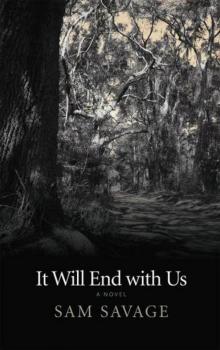 It Will End With Us
It Will End With Us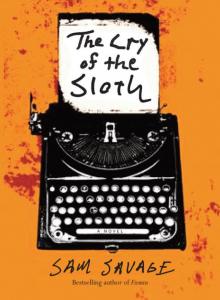 The Cry of the Sloth
The Cry of the Sloth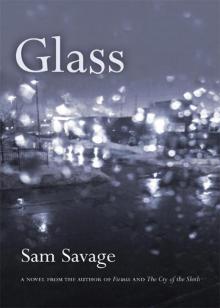 Glass
Glass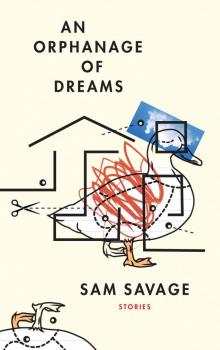 An Orphanage of Dreams
An Orphanage of Dreams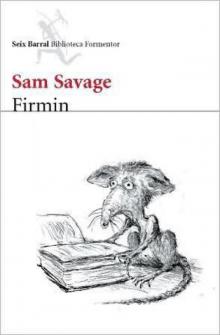 Firmin
Firmin Quantum Voices
Quantum Voices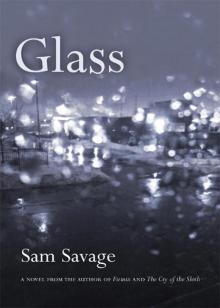 Glass (Small Press Distribution (All Titles))
Glass (Small Press Distribution (All Titles))